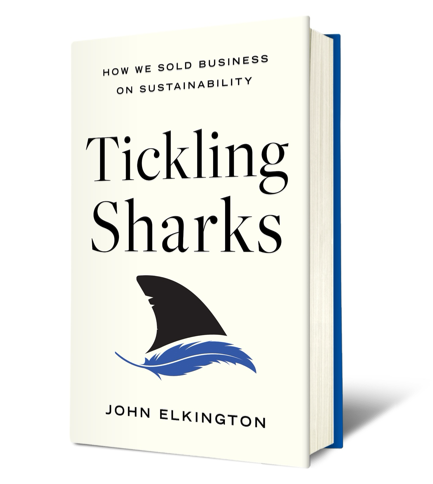Just Transitions Through A Pink-Tinted Kaleidoscope
The evolution of the Financial Times's coverage of climate, sustainability and system change trends is one of my key progress metrics
While the ESG recession is much-discussed, as in the second Climate Leaders Forum I spoke at in the House of Lords last week, one of my key indicators of the likely direction of market change is the coverage of related issues in the Financial Times. I have read the pink-paged business newspaper every day for decades, at least when in London—and wherever I can track it down in hotels and airport lounges.
For me, then, today’s paper spotlighted the extraordinary resolving power of this pink-tinted kaleidoscope. Let me just pick five of the stories they ran.
First, there was the full-paged ad for Projects for Nature. The headline tease ran as follows: “Can someone please create a matchmaking service that connects businesses to nature recovery projects based in England, screened by government, run by landowners, NGOs and oh you already have.”
Apparently, leading multinationals like the Lloyds Banking Group, the Scottish and Southern Electricity Networks, and GSK are already on board—having contributed nearly £700,000 to date.
This isn’t all going to be win-win
Good news, then. Less good news came in the form of a second item, an article titled, “Moscow is withholding vital Arctic climate data, warns Nato.” At a time when the Arctic is thought to be warming at least three times as fast as global average temperature rises, Russia first stopped sharing data when Moscow invaded Ukraine early in 2022.
One key reason, the FT notes, is that, “Russia, a major oil and gas producer, stands to lose as western economies steadily move away from burning fossil fuels.” It quotes Nato officials to the effect that, “Moscow is using a wide scale disinformation campaign against the benefits of decarbonisation.”
Third, and again exploring the impact of geopolitics on markets and our ability to address sustainability challenges, there is a full-page article entitled, “why Europe’s car crisis is made in China.”
At a time when EU car-makers are still struggling to recover from the COVID-19 pandemic, and electric vehicles are proving more expensive to manufacture in the region, China—in the form of companies like BYD, SAIC, Great Wall and Chery—is storming in with radically cheaper EVs.
Perfect storm
As the resulting waves of creative destruction cascade through the European economy, the FT concludes, the EU auto industry faces “a perfect storm”—particularly troubling for politicians, given that nearly 14 million people are currently employed in the sector across Europe and it is estimated to account for around 7 percent of the region’s GDP.
While it is easy to blame China, which is storming ahead both in terms of technology and cost, the FT team quotes sector experts who apportion a sizeable share of the blame to the EU industry itself—noting that a number of auto-makers had an early lead in EVs, but then squandered it.
The implications of all this are becoming clearer as the shock-waves cascade through our economies. Indeed the biggest story on the front page of today’s FT is titled, “Volkswagen’s plan to axe 3 German factories sets up battle with unions.”
Like German rivals such as Mercedes-Benz and BMW, VW “faces falling profit in China [from seals of VW cars there] as consumers cut spending and local brands take market share.” And that’s even before you get to the complexities of making the transition to EVs as dyed-in-the-wool internal-combustion-powered incumbents.
Just transition comes off boil
The fifth FT article makes its theme clear in its title, “EU gas sector ends talks with unions on staff support during fossil-fuel shift.” The initiative referenced is called the “Just Transition European Framework Agreement,” and is seen as critically important by the European Commission as it works to implement its European Green Deal.
The EU gas industry employs more than 220,000 people, according to Eurogas. The association has more than 100 members, including well-known companies like Equinox, Shell and TotalEnergies.
At a time when the EU approach to sustainability is becoming increasingly legalistic, it’s intriguing that people involved in the talks told the FT that some members were reluctant to endorse the framework because of the legal implications.
The original idea—and it is an excellent, necessary one—was to help workers currently active with offshore gas fields and pipelines, alongside storage facilities and office and domestic gas-fitters, to prepare for the transition to a very different mix of energy sources.
European president Ursula von der Leyen is quoted as saying that Brussels has been working towards a “quality jobs road map,” to help workers across the economy in general—and the gas sector in particular— to enjoy “fair wages, good working conditions, training and fair job transitions” as the relevant inevitable transformations crash through.
With the change agenda becoming increasingly politicised, this is what the future leadership challenge—for the private and public sectors alike— increasingly looks like.
Be ready—or prepare to become economic roadkill.
The key question now is whether today’s leaders have it in them to lead and enable the necessary structural changes, or whether they will need to be replaced by insurgent leaders, some populist, others more effective. My hopes still with the first trajectory, but my personal bets would increasingly be on the second.
John Elkington is Founder & Global Ambassador at Volans. His personal website can be accessed here. His latest book: Tickling Sharks: How We Sold Business on Sustainability (Fast Company Press, 2024).
What readers say:
“From the first page, you feel like you are sitting at John’s dinner table in a conversation that you never want to leave. He is a giant whose shoulders we all stand on. Here is to riding that 100-foot wave of regeneration ahead of us—with this book as our compass.”
JEAN OELWANG, founding CEO, Virgin Unite; author of Partnering
Available on Amazon and through good bookshops.




